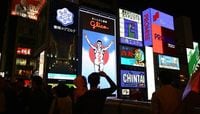
As a kid I loved Formula 1 (F1). After eagerly checking out the time of the next F1 race in the newspaper, I would plant myself in front of the TV at the appointed time.
Ever since I was a kid, Ayrton Senna was my childhood hero. The name “Senna” still evokes images of his red and white racing suit and McLaren racing car. In fact though, those distinctive colors have more to do with the cigarette sponsor than the McLaren car itself.
Looking back on those days, I feel that times have changed. If those racing colors were used at F1 races today there would be non-stop protests from any number of anti-tobacco organizations. That is how far society has come in terms of banning tobacco products.
Total smoking ban in Tokyo by 2020?
In Japan too there is more pressure to expand smoking bans by the time the Tokyo Olympic Games roll around in five years.
According to the Tokyo Shimbun, “An increasing number of restaurants and cafes are imposing a complete smoking ban, so that customers can enjoy their food without worrying about the smell of cigarettes. Most places doing this are fast-food chains, but more and more privately-owned yakiniku steak houses as well as cafes are also issuing smoking bans. Meanwhile some izakaya Japanese pubs hesitate enforcing a ban fearing it will deter customers.”
While it is no surprise that cafes and fast food restaurants in Tokyo have been placing smoking bans or creating designated smoking areas. I am little astonished that privately-run yakiniku steak houses have also started to enforce smoking bans.
As Japan prepares for the Tokyo Olympics, the debate in Japan over smoking bans is also intensifying. According to the Sankei News, “scrapping the original design for the new national sports stadium is creating uncertainty in plans for the 2020 Tokyo Olympics/Paralympics.
In addition, many questions have been raised about the extent of smoking bans in Tokyo. The issue is whether or not there should be a complete smoking ban at indoor facilities such as event venues and restaurants or whether there should be more work on segregated smoking areas.”
Medical professionals and antismoking organizations would like to see a complete smoking ban in restaurants and cafes become law. By contrast some owners of restaurants and cafes as well as the trade union for Japanese ryokan inns are opposed to a complete ban, insisting on segregated smoking areas.
The discussion has divided Japan into two sides—a complete nonsmoking ban vs segregated smoking.
As the battle between anti-smoking vs segregated smoking continues, both sides have overlooked a more important issue. Instead of framing the debate in terms of imposing a smoking ban in Tokyo that is similar to smoking restrictions in Europe or North America, priority should be placed on creating an environment that sensitively accommodates both smokers and nonsmokers.




